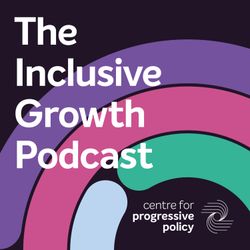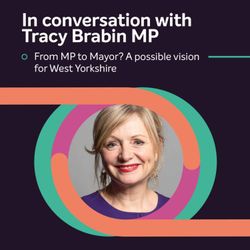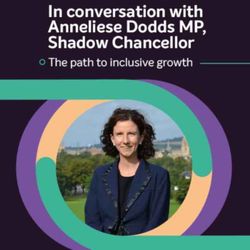Share

The Inclusive Growth Podcast - hosted by the Centre for Progressive Policy
EVENT: In conversation with Martin Vander Weyer & Edie Lush
From the Industrial Revolution to the internet, capitalism has been a great engine of human progress. But, according to the Spectator business editor it now stands accused of allowing the greedy few to run riot over the rest of society, exploiting workers and suppliers and recklessly damaging the planet in pursuit of profit. Where did these accusations come from – and are they true?
Martin Vander Weyer will argue in this in-conversation with journalist Edie Lush that capitalism has indeed lost its moral compass, lost public trust and is in urgent need of repair.
This reflective end-of-year event will ask, amongst other questions: Do businesses always operate in a social context? Can a ‘good’ business in a moral sense also be a business that rewards its creators and backers? What does 21st-century capitalism look like? Can faith in entrepreneurship and private-sector investment be reinstalled as a proven path to innovation and prosperity? If so, which of the core principles of our economic systems need revived? And is reaching net zero at the heart of its revival?
This event builds on CPP’s previous work on the Role of Business in Society and on previous discussions such as the role of corporations in levelling up.
More episodes
View all episodes

2. Post-COP26: how to ensure a fair transition to a green economy?
32:35||Ep. 2Episode 2 of the ‘Inclusive Growth Podcast: Post-COP26: how to ensure a fair transition to a green economy? CPP Co-Director, Zoë Billingham, discusses the fallout from the COP26 conference and where we go next to deliver a fair transition to net zero with Nick Tyrone and Professor Karen Turner. Nick Tyrone is a journalist and CPP Visiting Fellow and Professor Karen Turner is Director of the Centre for Energy Policy at the University of Strathclyde and former Scottish Just Transition Commissioner. Episode two unpacks where the government has got to on the fair transition to net zero, starting from the premise that the cost of inaction on climate change is far more than the cost of preventative action today. In the UK, CPP estimates that 2.4 million people rely on jobs in with high greenhouse gas emissions – industries which will need to industrially transform or decline over time. In this episode, we discuss how the transition can be delivered in a way that protects those vulnerable to a change from a carbon intense to a greener economy.
1. Inclusive growth, what is all about and why now? Episode #1
36:31||Ep. 1For the last decade, stagnant real wages have squeezed living standards, wealth has become increasingly concentrated and having a job has been no guarantee of stable, secure or sufficient income. The economy is no longer producing the quality of jobs people need to support their families and opportunities vary depending on where people live and what their background is. The pandemic has exacerbated the UK’s longstanding regional inequality and the questions of how to ensure the transition to a green economy - is gaining prominence.As inequality worsens and the capacity for communities around the world to shake off economic challenges is depleted, the case for switching to a new ‘inclusive growth’ model is intensifying.At the heart of our work is the belief that inclusive growth can allow individuals, families and communities across the UK to contribute and benefit from shared prosperity. For this to happen, people need access to good jobs and a supportive social infrastructure, including health, skills training and childcare. Economic policy must reflect this and recognise inclusive growth as a driver of productivity, both nationally and locally.In our first podcast, CPP’s director Charlotte Alldritt speaks with CPP’s Head of Research, Ben Franklin; the Senior Lead of the Inclusive Growth Network hosted by CPP, Annabel Smith; and Ben Lucas, Managing Director at Metro Dynamics.Our guests will be discussing why inclusive growth has never been more important and what they would like to see in the upcoming Spending Review, Budget and Levelling up White Paper - set to be published by the UK Government.
EVENT: In-conversation with Dambisa Moyo.
58:27|One of the 100 most influential people in the world according to TIME Magazine, Dr. Dambisa Moyo is a best-selling author and economist. Her work is focussed on the future of economic growth and placing living standards at the backbone of human progress. According to Moyo, the world is facing threatening economic headwinds including income inequality, the growing risk of a jobless underclass as digitalisation takes hold, unsustainable global debt and demographics shifts. All of these challenges require tackling the economic structures of work, health and education. In her recent book ‘How Boards Work’, Moyo addresses the levers and limitations boards have to create change across the business landscape. She poses questions around their purpose, around how they should balance profit motives with growing broader expectations of society and how they should approach quotas as they look to address diversity.Against the backdrop of a global drive for inclusive economic recovery from the pandemic, the challenges of transitioning to net zero, a rise of protectionism and new and emerging technologies, this event will consider how the future of capitalism will be shaped in the coming years and what role corporations should play when it comes to levelling up.
EVENT: A shared motto or common paths?
59:14|If the Trump era was about America First, President Joe Biden has made his administration about ‘jobs first’ – both in recovering from the greatest economic crisis since the Great Depression and in responding to climate change. Similarly, Prime Minster Boris Johnson – invigorated by a swathe of Conservative party victories in recent elections – has promised that the UK will go ‘from jab, jab, jab to jobs, jobs, jobs’. The US and the UK face the same conjuncture. The economics and politics of both countries have been driven increasingly by the salience of division and inequality – whether regional, racial, health, wealth or income related.Upon assuming the presidency, Joe Biden set out a vision for unity to rebuild in the devastating wake of Covid-19, but it would be no mean feat against a backdrop of historic uprising in the Washington State Capitol and the Black Lives Matter protests that had swept the nation – and the world – over the previous summer. With long term stagnant to falling middle class wages, an ever-polarising city vs rural divide and Covid pushing over 2 million women out of the US workforce, the question of how to build back better, and what this could mean for different people and places will define the future of the country in decades to come. In the UK, the challenges of shaping new, post-Brexit trade links are as much about responding to the grievances of the former red wall as an exercise in foreign diplomacy. The result in the recent Hartlepool by-election typifies the scale of political dislocation from ‘traditional’ values and voting patterns, all while our very constitutional existence is under question as a United Kingdom.Much hope on both sides of the Atlantic has been pinned on the creation of new, green jobs – simultaneously driving prosperity and reducing climate emissions. Trillions of dollars have been committed by the US President for investment in physical and – notably – social infrastructure. This investment-led approach to more sustainable, inclusive growth has been heralded by some as the timely and long overdue introduction of a firmer social safety net. Others fear the impact of this approach, overheating the economy with the sheer scale of federal financial intervention and shifting the US towards a model directly opposed to its founding 'small State’ principles. Meanwhile Boris Johnson’s Conservative Party is leading a seismic shift in UK politics in its mission to level up by tackling ingrained regional inequalities across the UK - territory previously the reserve of the Left. Investment in physical infrastructure and the quality of local high streets are high on the agenda, with the promise of a ‘skills and training revolution’ also in the offing.What do UK and US leaders – national and local – need to do to deliver on the hope of building back better? What are the key barriers to success? What can the UK learn from its US counterparts, and vice versa? How do we prevent this moment being a missed opportunity for systemic change? Are we witnessing a more fundamental shift in the Anglo-Saxon model that has shaped the development of modern capitalism in the UK, US and beyond? What might the results of this shift be in the medium – longer term?PanellistsPenny Abeywardena, NYC Commissioner & former Director of Girls and Women Integration (CGI)Heidi Binko, Executive Director & Co-Founder, Just Transition FundSunder Katwala, Director of British FutureBruce Katz, Founding Director of the Nowak Metro Finance Lab at Drexel University in PhiladelphiaSir John Kay, Economist
EVENT: Is the algorithm working for us?
59:39|The Centre for Progressive Policy talked to the former Chair of Ofqual, Roger Taylor, about what really happened during last year's exam debacle and what lessons we might draw on the future of algorithms, qualifications and fairness in education. Roger shared his thoughts publicly for the first time since stepping down from the regulator.In 2020 Covid closed 90 per cent of the world's schools. In the long list of harm caused by the pandemic, the disruption to the education of a generation may prove to be long lasting. One acute aspect of this was the difficulties countries faced in administering examinations. The UK and Ireland chose the unusual route of using co teacher assessments and predictions to estimate likely results. There was widespread agreement about the viability, even desirability, of the policy amongst education leaders before the event; and wholesale rejection by the people affected by it. There is much to learn from this.The episode has highlighted the tension between meritocracy and examinations. The Algorithm was rejected because it was intolerable that young people would have their futures determined by a prediction based on things such as which school they went to. Some were troubled by the extent to which some students would have done better than predicted. But others were equally troubled by the degree to which a child’s circumstances could account for how they would perform in exams. This year exams won’t be held because it would be unfair when children have had such different levels of access to education. But that leaves open the question of why they are fair in normal times, when pupils experience very different levels of educational support and the educational set backs that many children have suffered over the course of the pandemic will continue to affect them for years ahead.These events undermine public trust in the fairness of exams. Many employers have similar concerns, some of whom are turning away from exam grades as an indicator of employability and are instead using their own assessments which they claim give them a better understanding of their candidates and support more diverse hiring. In the past, the temptation for politicians has been to try to diffuse these tensions by degrading the quality of educational assessment, allowing grades to inflate or adopting untrustworthy forms of assessment. Rather than allowing this to happen, we need an approach that improves and expands the range of information that young people can use to demonstrate their skills.In this event, the former chair of Ofqual, Roger Taylor talked about fairness and quality in education and how the current system needs to change. Former Children's Commissioner Anne Longfield OBE and Chief Executive of the REC, Neil Carberry responded to the comments. The event was chaired by CPP's director Charlotte Alldritt.Key questions included: How can we create an education and assessment system that operates as a driver of social mobility? Or do we have unfair expectations about the degree to which education can tackle wider social and economic inequalities? How can the Department for Education ensure learning and assessment enhance children’s opportunities and bridge young people’s skills and potential with employers? In what ways can employers be further involved in these policies and in practice? How can we align the needs of measuring what a young person can do and assessing their potential whilst ensuring education standards? What is the role of data and digital technology in ensuring that robust assessment complements a meritocratic education system?Sign up here to receive invitations for future eventshttps://progressive-policy.us17.list-manage.com/subscribe?u=24e4a85116c5264bd2f871286&id=01d3d549a2
EVENT: The post-pandemic labour market: How do we create more and better jobs?
59:16|The labour market that emerges from the crisis will be very different from before the pandemic struck. The high street has been gutted by successive lockdowns and the acceleration of online retail sales. Other consumer behaviours and preferences may well be changed permanently as people have grown used to doing without their daily barista coffee or salon haircut, or – more importantly – as households feel the pinch of lower wages, shorter hours or redundancy and can no longer afford to do so. The government has done its best to incentivise job retention over the last twelve months, but a real risk remains of a spike in joblessness once furlough ends. The Office for Budget Responsibility anticipates unemployment could hit 6.5% this year and while a large economic bounce back is expected as the vaccines take hold, the economy is likely be scarred by the impact of coronavirus for years to come. This will intensify pre-existing regional inequalities, making the task of levelling up all the harder and all the more critical.The government has remained outwardly committed to levelling up as the cornerstone of its domestic policy agenda. But the recent Budget was still largely focussed on emergency support to tie the UK economy and workforce into the autumn. Soon we will need a detailed and actionable plan for jobs which seeks to respond to the challenges and opportunities ahead, boost the demand for good jobs and increase the supply of qualified people through the skills system. All while work itself is changing, not least through an expected permanent increase in remote working and the impact this will have on the nature and distribution of jobs – both those that can be done at home, and those for whom an office, factory and other fixed work settings remain compulsory or essential.The event will consider key questions including: How can we build on the government’s current Plan for Jobs and Plan for Growth to deliver the good jobs of the future? How should we prioritise different industries as the engines of job creation? To what extent will green growth or other emerging sectors offer opportunities in this context? How do we avoid the rise of insecure work and underemployment similar to that experienced after 2008? How can we revamp the skills system to support those who have been out of work and need reskilling into new good jobs? What can local government do to drive forward good jobs in their area?PanellistsDiane Coyle, Bennett Professor of Public Policy, University of CambridgeAnna Thomas, co-founder and Director, Institute for the Future of WorkMartin Vander Weyer, Business Editor of the SpectatorCharlotte Alldritt, Director, Centre for Progressive Policy (Chair)
EVENT: In conversation with Tracy Brabin MP
53:17|On the 6th of May residents of West Yorkshire will vote for the first time for their regional mayor in an election that will have ramifications beyond the region. The newly elected candidate will oversee a devolution deal which will include an annual £38 million budget, new powers over transport, education and housing and regeneration, as well as control of the Adult Education Budget. It’s no surprise the deal is being pitched by government as evidence of further investment in the Northern Powerhouse and its ongoing commitment to levelling up.But at a time when inclusive economic recovery is critical, the first mayor of West Yorkshire will also carve a place on the national political landscape. The tensions between local and central government have become all too clear during the pandemic with mayors gaining increasing attention. An additional mayoralty will influence economic and social policy making beyond the region, as well as shaping the devolution debate and wider constitutional issues for years to come.After a longstanding career in the public eye, Tracy Brabin became the Labour Member of Parliament for Batley and Spen in 2016. Re-elected in 2017 and again in 2019, she is now running for Mayor of West Yorkshire and, if successful, would be the first elected female mayor of a combined authority in England. Ahead of May’s local, mayoral and Scottish Parliament elections we will discuss her vision for the future of the region and how the first mayor for West Yorkshire could catalyse inclusive economic recovery and growth.Key questions include: What challenges and opportunities are likely to arise for West Yorkshire over the next four years and how can they be addressed? How has the coronavirus pandemic changed the role of local and regional leaders in shaping and delivering economic growth? How can mayors influence the levelling up debate and shape the Northern Powerhouse? How can they incentivise investment in their region to solve inequality and drive forward inclusive growth? In which ways might West Yorkshire shape the future of further devolution in England? What does a transition from MP to mayor involve in practice and which role can make the bigger difference?The event was chaired by Zoë Billingham, Head of Policy and Engagement, Centre for Progressive Policy.
EVENT: In conversation with Anneliese Dodds MP, Shadow Chancellor
57:27|The UK faces its worst recession in 300 years, with the threat that longstanding social and economic inequalities deepen further. Levelling up policies need to be built into our post-Covid economy, but how?Join us for this wide-ranging discussion with the Shadow Chancellor on how to build productivity and shared prosperity across the UK, and the road to inclusive growth.The event was chaired by Stephanie Flanders, Head of Bloomberg Economics & former chair of the Inclusive Growth Commission.